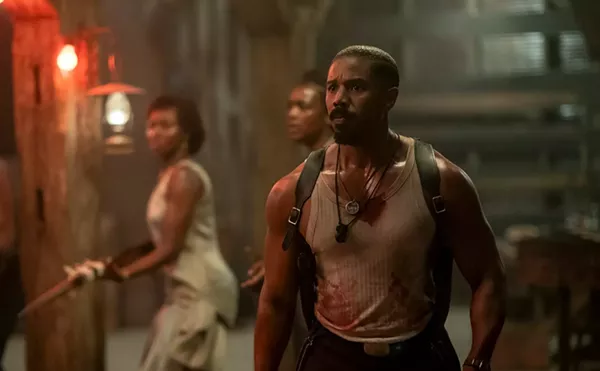
Audio By Carbonatix
[
{
"name": "GPT - Leaderboard - Inline - Content",
"component": "35519556",
"insertPoint": "5th",
"startingPoint": "3",
"requiredCountToDisplay": "3",
"maxInsertions": 100,
"adList": [
{
"adPreset": "LeaderboardInline"
}
]
}
]
In many African cultures, the drum represents the rhythm of life. Depending on the context, it can symbolize the sound of the heartbeat, the body’s main generator, at work. In simpler terms, it’s the foundation of any musical composition and the sound bed on which messages are laid.
Just as African people are known for weaving the drum’s rhythm into their spiritual and social philosophies, noted author-comedian-sociologist-talk-show host Bertice Berry believes it’s the drum that makes hip hop the dominant rhythmic lifestyle among youth and young adults: “Hip hop is the drum brought back,” she says. “I hear those rhythms … polyrhythmatic things going on, laying one layer on top of another layer. Something’s going on. Then I hear the lyrics and I go, ‘How did they get that far apart?’”
In her newest book, The Haunting of Hip Hop, Berry explores her question through an amalgamation of characters. The story revolves around three central figures. Harry “Freedom” Hudson, the top producer in hip hop, has yet to reach his full musical potential because he lends his abilities to rappers with lifeless messages. Meanwhile Ngozi, an enslaved African drummer who lived long ago, resides in limbo and cannot complete his transition from physical life until the story of his drum is told, preferably to Freedom. Ava Vercher, Freedom’s lawyer and one of the stabilizing influences in his life, appears to be the stereotypically strong black woman, but is truthfully much more complicated.
Berry weaves a host of supporting characters into the lives of these three. In the beginning, it makes for challenging reading, requiring that the reader remain vigilant through a string of short chapters, until pieces of a complex puzzle begin to fall into place. Quick scene changes flow like a soap opera, but make for very fast reading. And when the picture becomes clear, The Haunting offers poignant commentary on hip hop’s failure (and potential) to change the world through “the drum.”
At a recent book-signing at Apple Book Center in Detroit, Berry describes Ava’s character as “genius being destroyed, because it doesn’t come in the right form.” However, the same argument might be made about Freedom, the one character who is complicated from the first page. A 20-something player, his appetite for women battles his Southern-influenced upbringing, challenging values instilled by his spiritually rooted grandmother. His corked genius is reminiscent of Marvin Gaye’s. Thus his grandmother, his mother and Ava are the only women he holds in high regard, because they represent his highest ideal — the ultimate rhythm, within ultimate women.
Berry has a tendency to forecast the issues each character will face — an awkward tactic that makes sense by the end of the book. While Freedom deals with his own incompleteness, Ava, a cultured and civic-minded individual, deals with the habit of marking others by their faults. Charles, a childhood friend who grows up with too many European ways for Ava’s tastes, proves to be a key component in her healing.
Berry’s book, by her own admission, began as a ghost story and maintains mysterious elements that help to give the story a tinge of intrigue and even suspense. Supporting characters such as Johnny, a spirit murdered in boyhood, and Dora, Charles’ deeply spiritual and psychic grandmother, are crucial to understanding the book’s deeper messages. Dora, especially, is an essential character to understanding Berry’s intended scope:
“Old folks have learned some stuff,” Berry says, “and that should be obvious. But it’s not obvious to us, because we’re still holding them responsible for what they did or didn’t do. Yet, they’ve quietly learned some things. At a certain age, you’re closer to the truth, I believe.”
Fiction sometimes makes stronger commentary on real issues because, after all, if it’s too hard to swallow, we can say it’s only fantasy. This dichotomy gives readers an escape, but it plays out effectively in The Haunting of Hip Hop.
Freedom’s frequent lyrical collaborator, gangsta MC Elum N Nation, stands next to Freedom like a monkey beside a mastodon. Similarly hip hop, the drum made perfect, is “haunted” by irresponsibility and cultural disconnection. Berry’s argument is that a medium so powerful wastes itself promoting regressive thought processes. Once it reconnects with its traditional spirit and rhythm, it may, as Chuck D of Public Enemy once commented, become black folks’ CNN and not their Cartoon Network.
Khary Kimani Turner writes about music for Metro Times. E-mail letters@metrotimes.com.





